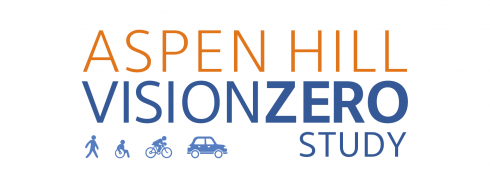Montgomery Planning invites the community for a bilingual opportunity to identify pedestrian safety concerns during a neighborhood walking tour, starting at the Aspen Hill Library
SILVER SPRING, MD – The Montgomery County Planning Department, part of The Maryland-National Capital Park and Planning Commission, is inviting anyone who lives, works or has an interest in safety issues in Aspen Hill to walk the area’s streets on Saturday, November 3 from 10 a.m. to 12:30 p.m. and tell planners about their experiences. This survey will help inform the Aspen Hill Vision Zero Study, which aims to eliminate traffic related fatalities and severe injuries on Georgia and Connecticut Avenues, and other local roads. The study will examine ways of improving safety and connectivity to community amenities for pedestrians, drivers and bicyclists.
“No one knows the community better than its residents,” says planner Maren Hill who is leading the study. “That is why we want to bring everyone together to survey the Aspen Hill Vision Zero Study area and tell us about what works and what doesn’t, so we can work together to make the area safer for everyone who walks, bikes, takes transit or drives in Aspen Hill.”
The Walk Audit on November 3 is a bilingual opportunity and starts at the Aspen Hill Library (4407 Aspen Hill Road, Rockville, MD). During the event, participants will rate the walkability of their community, including crossings, intersections, sidewalks, length of time for crossing streets, the comfort of walking experiences and frequency of bus shelters, among other elements.
This event follows the first public meeting on September 26, 2018 that was held to launch the Aspen Hill Vision Zero Study. That session included a discussion about Vision Zero policy, the role of Montgomery Planning and how the community can be involved with the study. View the Montgomery Planning recap video to learn more.
Walk Audit Details
Date: Saturday, November 3, 2018
Time: 10 a.m. to 12:30 p.m.
Location: Aspen Hill Library (4407 Aspen Hill Rd, Rockville, MD)
RSVP for the event
Sign up to join the Walk Audit. Students may earn Student Service Learning Hours (SSL).
Questions? Contact lead planner Maren Hill to learn more.
About the Aspen Hill Vision Zero Study
During the planning process for the 2015 Aspen Hill Minor Master Plan Amendment and the ongoing Veirs Mill Corridor Master Plan, community members expressed concern about pedestrian safety at major intersections. This Vision Zero Study is one component of an overall assessment of a variety of issues in the Aspen Hill area that will frame and inform future planning actions.
Montgomery Planning is collaborating with the community on potential strategies to make major intersections safer for all road users along Georgia and Connecticut Avenues in the Aspen Hill area. The Vision Zero study area includes the land area between Georgia and Connecticut Avenues that extends north from the intersection of Connecticut and Georgia Avenues to Bel Pre Road and south of the intersection to Matthew Henson Park.
The Aspen Hill Vision Zero Study will examine ways to:
- Enhance connectivity by improving safety for all road users
- Explore solutions to reduce speeds and conflicts on the road.
- Establish direct, safe connections to transit, community facilities, and other destinations.
- Examine potential for redevelopment of commercial shopping centers.
- Engage residents, business owners, and civic associations.
- Collect and analyze data to inform priorities.
If you cannot attend public meetings but want to get involved with the plan, sign up for the Aspen Hill Vision Zero e-letter or contact project manager Maren Hill. Learn more about the Aspen Hill Vision Zero Study.
What is Vision Zero?
The premise of Vision Zero is that transportation-related deaths and severe injuries are preventable and unacceptable. People are inherently vulnerable and speed is a fundamental predictor of crash survival. Vision Zero is an approach to traffic safety where transportation systems are designed to anticipate human error and created for speeds that protect human life.
Jurisdictions all over the world have adopted Vision Zero policy initiatives to eliminate severe traffic injuries and fatalities. In 2016, Montgomery County became one of the first counties and suburban communities to commit to Vision Zero. As a suburban community, Montgomery County’s development patterns—longer blocks, wider driving lanes, and lower densities — encourage motorists to drive at higher speed and present unique challenges to achieving Vision Zero.
